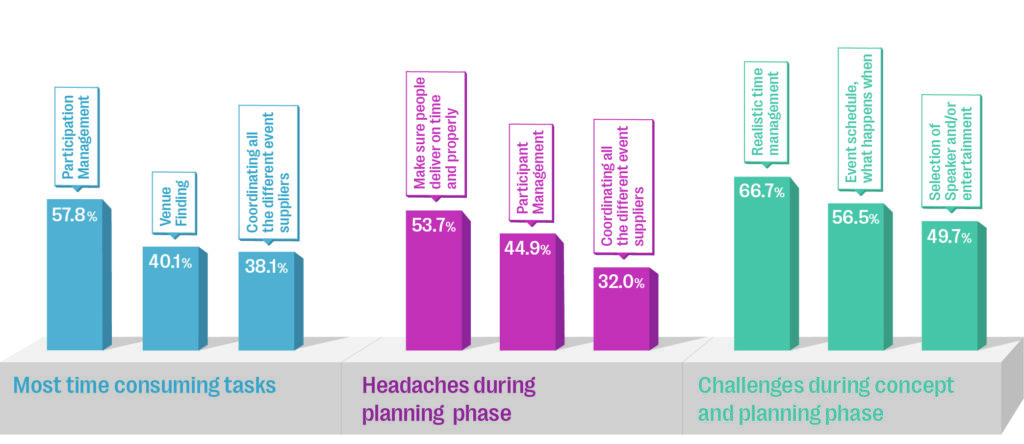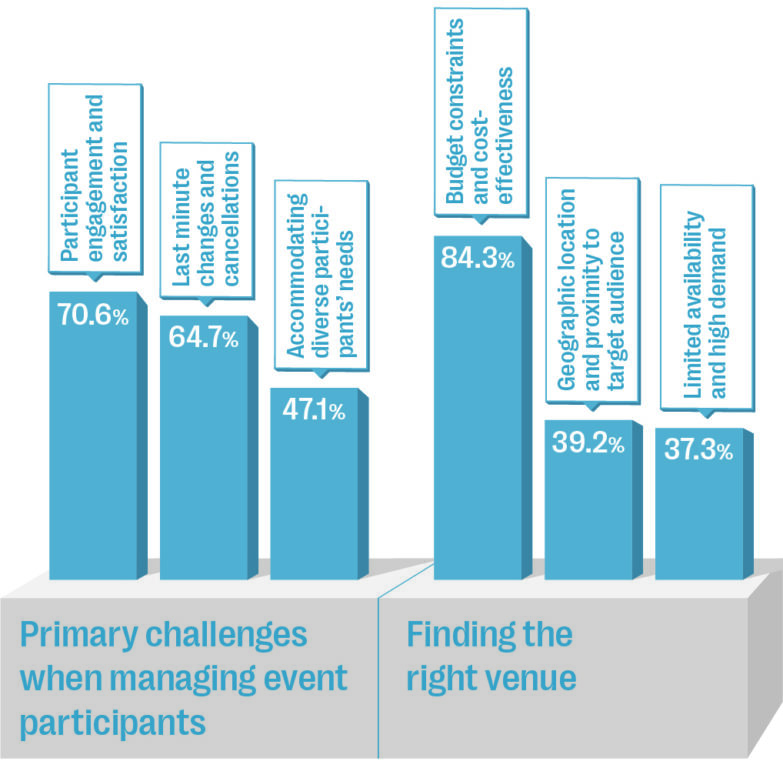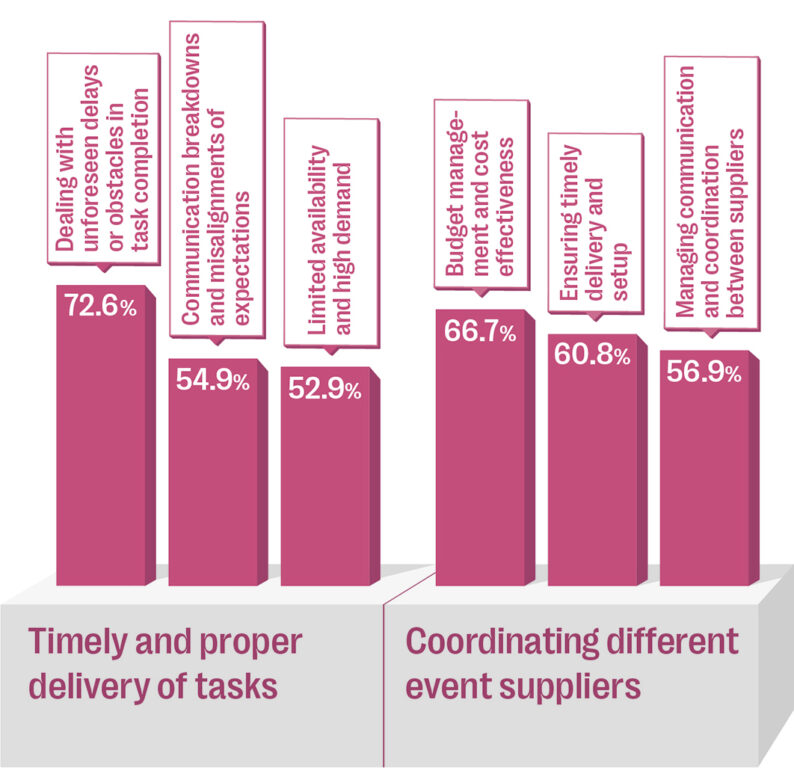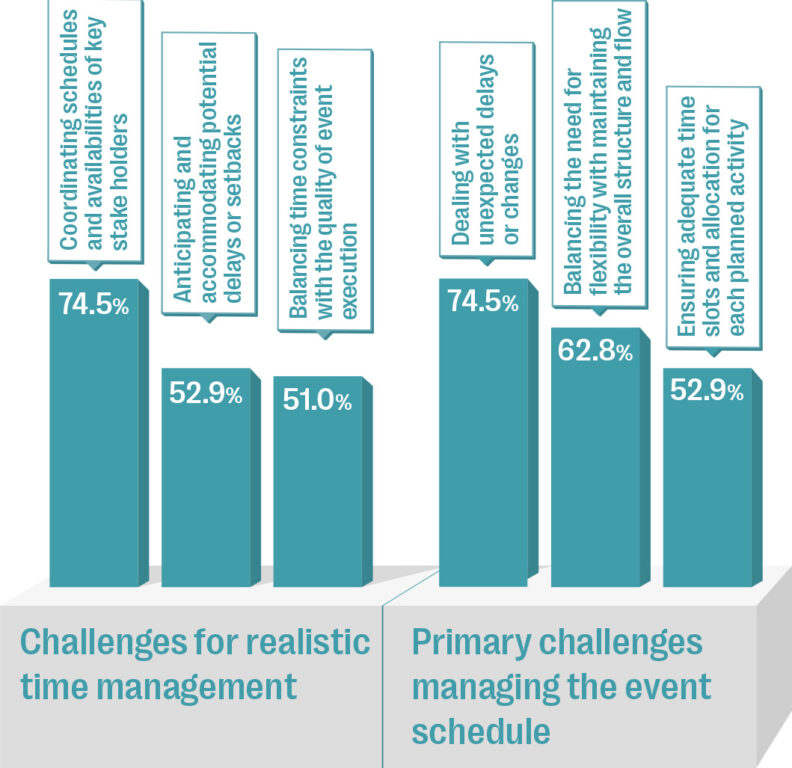
Melanie Huber shares the results and provides expert insights into Trafo Baden’s recent surveys on event planning for Assistants
In the ever-evolving realm of executive assistance, the responsibilities transcend traditional administrative tasks and can include orchestrating events with precision and expertise. Recognizing the intricate challenges that event planning introduces to this dynamic role, in cooperation with Executive Support Media, we (Trafo Baden) have undertaken two insightful surveys.
We aim to highlight specific “pain points” and share comprehensive knowledge to make event planning more efficient for Executive Assistants. In this article, we explore the most pressing issues our surveys discovered.
Result Highlights from the First Survey

Most time-consuming tasks
Event planners are well acquainted with the time-consuming nature of their work. The survey identified three key tasks that consistently top the list:
1. Ensuring active and engaged attendee participation
Managing registrations, communicating with attendees, and creating an environment conducive to engagement require meticulous planning.
2. The search for the perfect venue
Identifying a venue that aligns with the event’s vision, accommodates participants, and meets logistical requirements demands a nuanced approach.
3. Coordinating various event suppliers
Synchronizing the efforts of different suppliers, ensuring adherence to timelines, and troubleshooting issues calls for effective communication and project management skills.
Top 3 headaches during the planning phase
While time-consuming tasks form a significant part of event planning challenges, the planning phase introduces its own set of headaches. The top three challenges identified during this phase are:
1. Ensuring timely and proper delivery
The foremost challenge during the planning phase, with 54% of respondents expressing difficulty in managing elements to meet deadlines and quality standards. This underscores the importance of effective communication and proactive problem-solving.
2. Managing participants
A recurring issue! Beyond logistical aspects, participant management involves addressing queries and fostering positive interactions, reinforcing the need for a comprehensive communication strategy.
3. Challenges associated with coordinating different event suppliers
Also mentioned during the planning phase. This emphasizes the ongoing nature of supplier coordination, requiring constant vigilance and proactive problem-solving.
Top 3 challenges during the concept and planning phase
The concept and planning phase of event management introduces a different set of challenges. The top three issues identified in this phase are:
1. Realistic time management
A critical challenge during the concept and planning phase. Setting achievable timelines and milestones is crucial to ensure a smooth planning process.
2. Crafting a comprehensive event schedule
This proved challenging for 56% of respondents. This emphasizes the need for thorough planning to account for every aspect of the event, essential for keeping stakeholders on the same page.
3. Difficulty in selecting suitable speakers and entertainment options
Nearly half of the respondents cited this as a major challenge during the concept and planning phase. Both speakers and entertainers must be chosen according to the audience. When hiring a speaker, make sure you discuss the proposed content with them. On-screen presentations must always be checked for dimensions (16:9), errors, and image quality. Ideally, you will have mapped demographic factors such as age, gender, and profession to better identify a suitable type of entertainment.
Result Highlights from the Second Survey
The second survey focused on the primary challenges highlighted in the first survey’s findings. This second set of questions provided a nuanced understanding of the challenges administrative professionals face when managing participants and selecting the right venue.

Participant Management: Issues and Solutions
Participant engagement and satisfaction
Managing participant engagement and satisfaction emerged as a significant challenge. The key is to extend our strategies beyond the event day, implementing interactive sessions, creating personalized experiences, and establishing continuous feedback loops to ensure a lasting positive impression.
Solutions/Tips
- Interactive Sessions: Infuse events with live polls, Q&A sessions, and group discussions to enhance participant engagement.
- Personalized Experiences: Tailor content to diverse participant interests, ensuring a more engaging and personalized event environment.
- Continuous Feedback Loops: Set up mechanisms for real-time feedback during and after the event, allowing for insights that drive continuous improvement.
Navigating uncertainties
Navigating uncertainties tied to last-minute changes and cancellations is a universal challenge faced by event planners. To tackle this, we advocate for robust contingency planning, clear communication protocols, and flexible policies that ensure adaptability without compromising participant satisfaction.
Solutions/Tips
- Contingency Planning: Develop comprehensive plans that account for potential disruptions, enabling quick adaptation to changes.
- Communication Protocols: Establish transparent communication channels with participants, speakers, and vendors to relay timely updates.
- Flexible Policies: Implement policies that accommodate unforeseen circumstances while prioritizing participant satisfaction.
Participants’ needs
Addressing the diverse needs of participants is also an ongoing challenge for respondents. The key lies in proactive strategies such as pre-event surveys, providing diverse offerings, and establishing a dedicated support system to ensure inclusivity.
Solutions/Tips
- Pre-Event Surveys: Collect detailed information about participant preferences and requirements, guiding tailored event planning.
- Diverse Offerings: Offer a variety of sessions, catering options, and amenities to meet diverse participant interests.
- Dedicated Support: Create a dedicated support system to address individual requirements, ensuring a seamless experience for all participants.
The Venue: Issues and Solutions
Budgetary constraints
Managing budget constraints and ensuring cost-effectiveness tops the list as the most significant challenge, noted by 84% of respondents. The key is to adopt strategies like prioritized budgeting, effective negotiation, and exploring alternative venue options to strike a balance between quality and cost.
Solutions/Tips
- Prioritized Budgeting: Clearly define event priorities, allocating budget resources strategically to focus on key success factors.
- Negotiation Strategies: Engage in transparent negotiations with venue owners, exploring discounts, package deals, or sponsorships.
- Alternative Options: Consider unconventional venues or partnerships to overcome budget constraints without compromising event quality.
Location, location, location
Ensuring the venue’s geographic location aligns with the target audience is a challenge for 39.22% of respondents. This can be addressed by conducting audience research, considering transportation factors, and incorporating virtual components to overcome geographical limitations.
Solutions/Tips
- Audience Research: Thoroughly research demographics and preferences to select a location aligned with audience needs.
- Transportation Considerations: Choose venues with good transportation links, enhancing accessibility for participants.
- Virtual Components: Consider virtual or hybrid elements to extend the event’s reach, overcoming geographical constraints.
Availability and demand
Navigating limited availability and high demand for preferred venues is yet another concern. Strategic planning is key, involving advanced booking, consideration for off-peak times, and building relationships with venue owners for priority access.
Solutions/Tips
- Advanced Planning: Initiate venue search and booking processes well in advance to secure desired dates and spaces.
- Off-Peak Considerations: Explore hosting events during less popular times to increase the likelihood of securing preferred venues.
- Relationship Building: Cultivate relationships with venue owners for priority booking status and favourable terms.
Let’s turn our focus to the challenges associated with timely task delivery and the coordination of various event suppliers. The results shed light on the following key challenges:

Timely and Proper Delivery of Tasks
Managing delays and obstacles
The foremost challenge identified in the timely delivery of tasks revolves around unforeseen delays or obstacles. Managing unexpected setbacks is essential for maintaining the overall event timeline.
Solutions/Tips
- Contingency Plans: These plans should account for potential obstacles, ensuring a swift response to unexpected delays.
- Regular Updates: Establish open lines of communication, allowing for quick identification and resolution of obstacles.
- Real-time Communication Channels: Establish real-time communication channels within the team to quickly address and communicate any unforeseen delays or obstacles, enabling prompt problem resolution.
Communication
Effective communication is key to successful event planning, but more than half of respondents identified communication breakdowns and misalignments of expectations as significant challenges. Clear and consistent communication is crucial for avoiding misunderstandings.
Solutions/Tips
- Communication Protocols: Implement clear communication protocols to ensure all team members are on the same page regarding expectations and timelines.
- Regular Check-ins: Schedule regular check-ins to assess progress, address concerns, and confirm that everyone involved has a shared understanding of the project.
- Documentation of Expectations: Document expectations and key project details in a centralized location, providing a reference point for all team members to ensure alignment.
Scheduling
Coordinating schedules across diverse team members emerged as a challenge for 53% of respondents. Ensuring everyone is working in sync is crucial for achieving seamless task delivery.
Solutions/Tips
- Centralized Scheduling: Utilize centralized scheduling tools to coordinate and align the schedules of different team members, ensuring visibility and accessibility.
- Regular Planning Meetings: Conduct regular planning meetings to discuss schedules, clarify expectations, and address any conflicts or overlaps.
- Flexibility and Adaptability: Encourage a culture of flexibility and adaptability, allowing team members to adjust schedules when necessary while maintaining overall project timelines.
Coordinating Different Event Suppliers
Budgets
Managing budgets effectively while ensuring cost-effectiveness is a primary concern for two-thirds of respondents. Striking a balance between quality and costs is essential for successful event execution.
Solutions/Tips
- Transparent Budgeting: Foster transparency in budgeting, ensuring that all suppliers are aware of financial constraints and expectations.
- Negotiation Strategies: Engage in open negotiations with suppliers, exploring opportunities for discounts, bulk deals, or alternative cost-saving measures.
- Prioritization of Essential Services: Clearly define and prioritize essential services to allocate budget resources effectively, focusing on aspects that contribute the most to the event’s success.
Delivery and setup
Timely delivery and setup are crucial for the smooth flow of events, and 61% of respondents highlighted challenges in this area. Delays in setup can ripple through the entire event schedule.
Solutions/Tips
- Detailed Event Timelines: Provide suppliers with detailed event timelines, specifying delivery and setup expectations to ensure alignment with the overall schedule.
- Early Coordination: Initiate communication with suppliers well in advance, emphasizing the importance of timely delivery and setup and addressing any potential logistical challenges proactively.
- Site Visits and Rehearsals: Conduct site visits and rehearsals with key suppliers to identify potential setup challenges and ensure that they are well-prepared for the event.
Effective communication
Effective communication and coordination between different suppliers was identified as a challenge for more than half of the respondents. Ensuring that all suppliers work in harmony is critical for a seamless event.
Solutions/Tips
- Centralized Communication Hub: Establish a centralized communication hub, such as a shared online platform, where all suppliers can access relevant information and updates and communicate with each other.
- Regular Coordination Meetings: Host regular coordination meetings with all suppliers to discuss upcoming tasks, address concerns, and foster collaboration, ensuring everyone is aligned with the overall event vision.
- Designated Liaison: Appoint a designated liaison or point of contact for each supplier, facilitating smoother communication channels and reducing the risk of miscommunication or coordination breakdowns.
Last but not least, we focused on the complexities of time management and the intricacies of managing event schedules. The findings provide a nuanced understanding of the following key challenges.

Realistic Time Management
Scheduling
Coordinating the schedules and availability of key stakeholders emerged as the most prominent challenge. Effective time management relies heavily on aligning the availability of essential contributors.
Solutions/Tips
- Advanced Scheduling: Initiate scheduling conversations well in advance, allowing for better coordination and the identification of potential conflicts.
- Utilize Scheduling Tools: Leverage scheduling tools or software to facilitate seamless coordination, ensuring visibility into the availability of key stakeholders.
- Flexible Meeting Options: Offer flexible meeting options, such as virtual meetings or asynchronous communication, to accommodate diverse schedules.
Delays and setbacks
Anticipating and accommodating potential delays or setbacks was identified as a challenge by more than half of respondents. Proactive planning is essential to navigate unexpected hurdles effectively.
Solutions/Tips
- Comprehensive Contingency Plans: Develop comprehensive contingency plans that account for potential delays or setbacks, providing a roadmap for swift adaptation.
- Regular Risk Assessments: Conduct regular risk assessments to identify potential challenges and develop strategies to mitigate their impact on the overall timeline.
- Buffer Time Allocation: Allocate buffer time in the schedule to accommodate unexpected delays without disrupting the entire timeline.
Time versus quality
Balancing time constraints with the quality of event execution posed a challenge for half of the respondents. Striking the right balance between efficiency and excellence is crucial for successful event outcomes.
Solutions/Tips
- Prioritize Essential Tasks: Clearly define and prioritize essential tasks, ensuring that critical elements receive the necessary time and attention.
- Continuous Monitoring: Implement continuous monitoring of time allocations, allowing for adjustments to maintain a balance between time constraints and quality.
- Efficiency Enhancement Strategies: Identify and implement efficiency enhancement strategies, such as streamlined processes or technology adoption, to optimize time usage.
Managing the Event Schedule
Delays and changes
Dealing with unexpected delays or changes emerged as the most significant challenge in managing the event schedule, affecting three-quarters of respondents. Navigating unforeseen disruptions is vital for maintaining the overall flow of the event.
Solutions/Tips
- Flexible Schedule Structurers: Design event schedules with built-in flexibility to accommodate unexpected delays or changes without causing a domino effect.
- Effective Communication Protocols: Establish clear communication protocols for disseminating information about delays or changes promptly, allowing for quick adjustments.
- Real-time Monitoring: Utilize real-time monitoring tools to track the progress of scheduled activities, enabling swift responses to unexpected delays.
Flexibility versus structure
Balancing the need for flexibility with maintaining the overall structure and flow of the event presented a challenge for 62.75% of respondents. Striking the right balance is crucial for a seamless and well-coordinated event.
Solutions/Tips
- Structured Contingency Plans: Develop structured contingency plans that provide a framework for maintaining the overall structure while incorporating flexibility.
- Scenario Planning: Conduct scenario planning exercises to anticipate potential disruptions and establish strategies for maintaining event flow.
- Event Rehearsals: Conduct comprehensive event rehearsals to test the flexibility of the schedule and identify areas for improvement.
Timing
Ensuring adequate time slots and allocation for each planned activity posed a challenge for 52.94% of respondents. Proper time allocation is fundamental to a well-executed and enjoyable event.
Solutions/Tips
- Thorough Activity Planning: Conduct thorough planning for each activity, estimating the time required for optimal execution.
- Consultation with Stakeholders: Collaborate with key stakeholders, including speakers, performers, and vendors, to determine appropriate time allocations for their contributions.
- Post-Event Analysis: Perform a detailed post-event analysis to assess the accuracy of time allocations and identify areas for improvement in future planning.
The Secrets of Success
In the dynamic world of event planning, success is an art form painted with adaptability and strategic finesse. From engaging participants to coordinating suppliers and navigating the intricacies of time, our insights offer a concise toolkit for event planners.
Armed with solutions to challenges, these tools go beyond logistics – they shape moments etched in participants’ memories. As the curtain falls on this first exploration, consider it a prelude to your next event masterpiece. May every challenge met be a note in your symphony of success, crafting experiences that resonate long after the final bow. Here’s to your next triumph in the ever-evolving world of event planning.
For a deeper dive into the intricacies of event planning, visit our blog for comprehensive insights and continuous updates on mastering the art of orchestrating unforgettable experiences.











